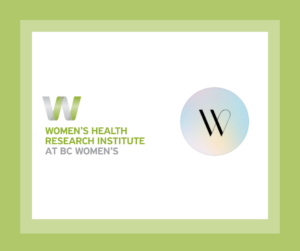
The Women’s Health Research Club (WHRC) is a student-run club at the University of British Columbia that has initiated a collaboration with the WHRI. Our communications team, had the pleasure of sitting down with the WHRC leads to find out who they are, what they do, and how members and trainees from the WHRI can engage with them.
what is the Women’s Health Research Club?
The WHRC brings together a group of interested, motivated and passionate students in spreading awareness on the issues that women, gender-diverse and trans people face, as well as inspiring undergraduates to pursue careers in health research.
OUR OBJECTIVES ARE:
Inspire undergraduates to pursue a career in women’s health research by active participation in the field, including volunteer positions in research labs, advocacy and awareness.
Bridge gaps in the understanding of women’s health research through knowledge translation workshops and social media posts.
Advocate for gender-inclusive studies by influencing those in higher positions to allocate more funding towards the cause!
We currently have 24 club members and have gained an engaged following of around 280 UBC students on social media.
what is the Women’s Health Research Club? What is your role with women’s health Research club and how did you get involved?

Sahel: I am a fourth year biology student at UBC and co-founder and President of the Women’s Health Research Club with experience as an undergraduate trainee in Women’s Research. I conceived the idea of starting this club in my third year of university after volunteering at BC Women’s Hospital and noticing a significant gap in opportunities on campus for involvement. My further research revealed major gaps in funding and knowledge, prompting the need for a community on campus to help advocate for change.
The club was established 8 months ago, with significant growth in the last 3 months after hiring motivated and passionate undergraduate students. I have been able to successfully delegate and lead multiple initiatives in the club, such as assisting with our knowledge mobilization initiatives and event planning. It has been a dream to be able to do this work, and I am glad to see our members’ are engaged and receptive to our club’s mission!

Shadi: I am a fourth-year psychology student at UBC and co-founder and Vice President External of the Women’s Health Research Club. Recognizing a critical need for specialized attention to women’s health issues, I collaborated with Sahel and Jenny to establish a club dedicated to advancing women’s health and promoting inclusive research practices. In my role as VP External, I oversee the Outreach, Events, and Community Engagement committees. This involves taking the lead in planning and executing events that not only educate students on current trends in women’s health, but also provide opportunities to build valuable connections within the field. The journey of creating this club has been truly rewarding, and I am committed to contributing to the advancement of women’s health through our club’s initiatives.

Jenny: I am a fourth-year biology student at UBC and the co-founder and Vice President Internal of the Women’s Health Research Club. Raising awareness about the issues facing the women’s health research is crucial in establishing funding and generating interest in the field. Therefore, I am thrilled to collaborate with Sahel and Shadi on engaging UBC students through online and in-person methods via the WHRC. As VP Internal, I oversee the Research Communications, Social Media, and Graphic Design committees. These responsibilities involve cultivating the club’s culture and online community, as well as facilitating knowledge translation efforts and event marketing. It has been an absolute privilege to provide UBC students with a space to explore and advocate for areas of health research that captivate their interest. I’m looking forward to the expansion of our outreach and impact on the women’s health research community.
How does the women’s Health research club support canada’s women’s health research community?
Our current focus is mobilizing knowledge on women’s research, highlighting the various career paths that undergraduates can pursue in the field of women’s health research, and advocating for increased funding and opportunities.
Through our Research Communications Series on Instagram, we aim to convey information from scientific papers to a lay audience, ensuring that crucial health related information reaches everyone. Furthermore, we highlight and debunk common myths and misconceptions regarding women’s research as part of our Mythbusters Series on social media. By dispelling fear-inducing statistics, we empower and allow people to be more informed when discussing the health of women, trans, gender-diverse peoples’ health. Furthermore, our Community Engagement Initiative involves interviewing people with lived experiences related to specific health conditions. We strive to explore their perspectives on what further research and support is needs. Lastly, we host Seminar Events where we provide a platform for influential speakers to address UBC students, sharing their important work in women’s health research. These speakers can illuminate their career pathways, offering what led them to the field of women’s health research, provide valuable insights, and motivations to students who are passionate about getting involved.
WHAT IMPACT DO YOU HOPE TO SEE FROM WOMEN’S HEALTH RESEARCH CLUBS EFFORTS?
We hope to see students engaged and aware of the disparities affecting women’s health research so that they can take action and advocate for inclusive sex and gender-based studies. We recognize that now is the best time to provide this information, undergraduates, considering that many undergraduates are still exploring career choices. We hope our club will allow them to consider all the possible paths that they can pursue, including women’s, trans and gender-diverse people’s research.
Presently, we stand as the sole club or student group on campus engaged in this critical work. While is it disheartening to identify this gap, we are pleased to have initiated this work, fostering greater engagement in these crucial conversations. Numerous diseases are specific to women, making it imperative for everyone to be knowledgeable and aware of their related symptoms. This knowledge empowers people to advocate effectively for themselves, their families, and their friends.
WHAT EXCITES YOU MOST ABOUT THE WORK YOU DO?
What excites us the most is the opportunity to be involved, in contributing to women’s health as well as reshape the narrative surrounding advocacy efforts in clubs. When we boil our club mission down, we are rooted in feminism. While there’s been a lack of exploration into intersectional feminism on campus, we see this as an exciting chance to introduce more comprehensive perspective to women’s health. We are thrilled to introduce an intersectional lens that considers factors like race, biological sex, socioeconomic status, and education and recognizing their potential impacts on health outcomes. It’s an inspiring journey to be a part of this change and enhance the dialogue around women’s health.
IS THERE ANYTHING THAT’S SURPRISED YOU IN PLANNING AND LAUNCHING WHRC?
The outward excitement and engaging attitude from students has been both exciting and surprising. When we were initially starting the club, we had not expected students would be interested or knowledgeable about our club mission, in part due to a lack of awareness. However, we have managed to assemble an incredible team of passionate undergraduates and postgraduates who are engaged and excited to be part of our club.
WHERE CAN You LEARN MORE ABOUT WHRC?
You can follow us on Instagram @whrclub.ubc to stay tuned for updates on our initiatives, read our knowledge translation posts, and learn more about women’s health research. If you have any questions, comments, or inquiries, please reach out to us over email at whrclub.ubc@gmail.com !